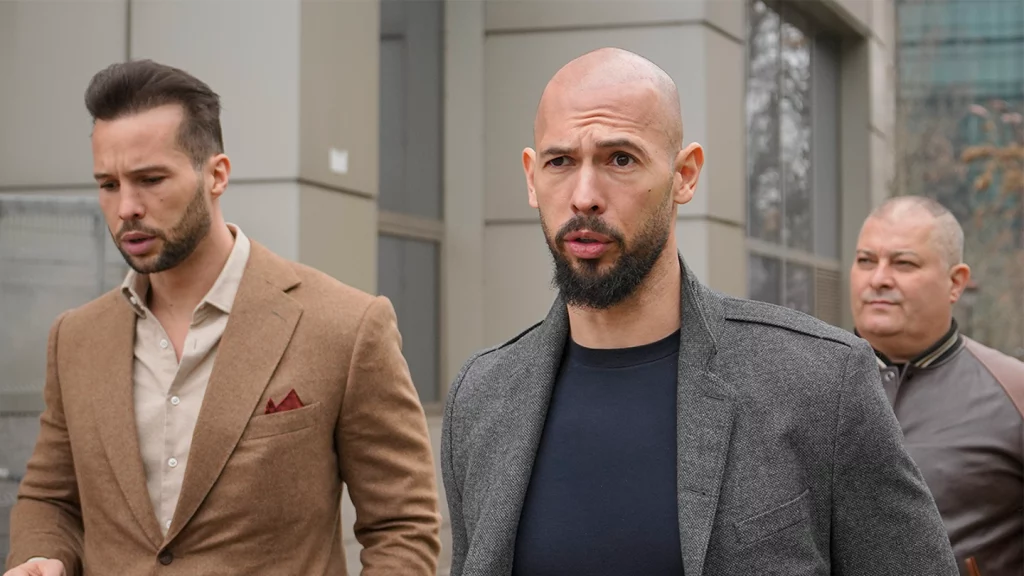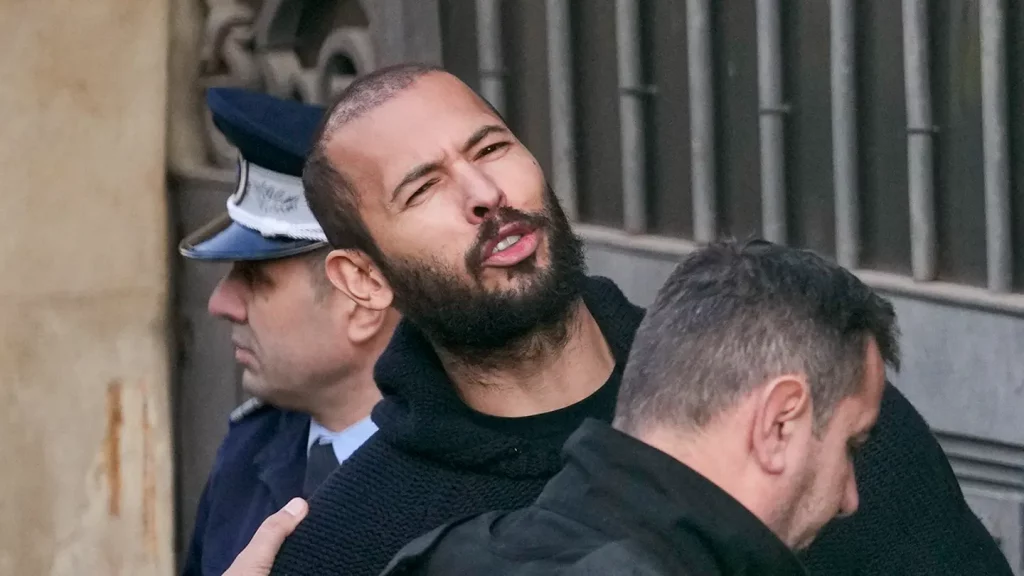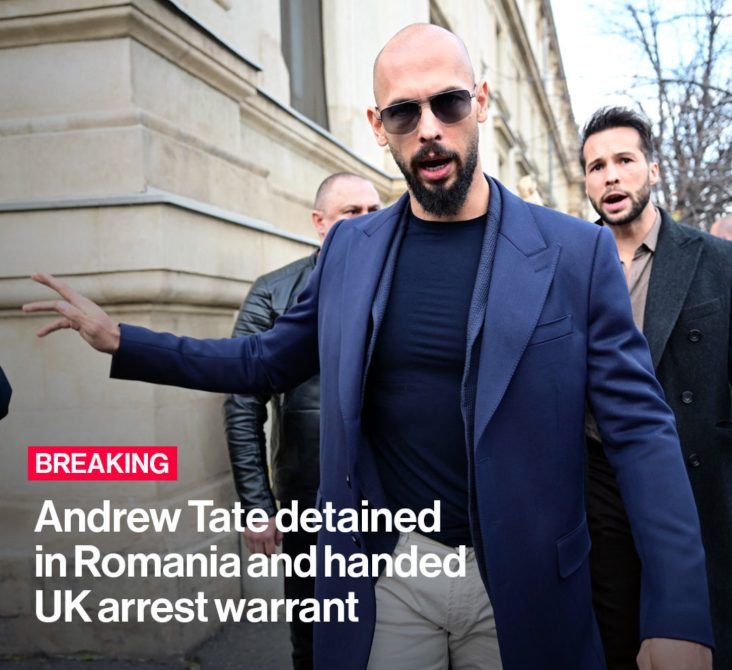In recent headlines, the name Andrew Tate has become synonymous with a legal saga spanning multiple jurisdictions, allegations of sexual aggression, and the complexities of extradition law. This article delves into the intricate details surrounding Tate’s detention in Romania, the issuance of a UK arrest warrant, and the ensuing legal battles that have captivated public attention.
Detention and Extradition Proceedings
The story begins with the detention of Andrew Tate and his brother Tristan in Romania on allegations of sexual aggression stemming from a UK case dating back to 2012-2015. The Bucharest Court of Appeal’s decision to grant an extradition request from British authorities came as a pivotal moment in the legal proceedings. However, the court’s stipulation that extradition would only occur after the conclusion of legal proceedings in Romania added a layer of complexity to an already convoluted case.

Allegations and Legal Battles
At the heart of the matter lie the allegations of sexual violence and physical abuse leveled against Andrew Tate. Four women reportedly reported Tate to UK authorities, alleging acts of sexual aggression and physical abuse. Despite their efforts, the Crown Prosecution Service’s decision not to prosecute Tate prompted the alleged victims to seek alternative avenues for justice. Enter crowdfunding – a grassroots effort to support their legal battle against Tate and hold him accountable for his actions.
In Romania, the legal landscape took a different turn as Tate found himself facing charges of rape, human trafficking, and forming a criminal gang to sexually exploit women. The indictment of Tate, his brother, and two Romanian women further complicated the legal proceedings, setting the stage for a protracted legal battle fraught with twists and turns.
Also: Taylor Swift Conspiracy Theories Hold Sway With 1 in 5 Americans
Response from Tate’s Camp
Amid the mounting allegations and legal battles, Andrew Tate and his camp vehemently denied the charges, citing a lack of evidence and alleging a political conspiracy aimed at silencing him. Tate’s vocal defense of his innocence and criticism of the legal proceedings underscored the high stakes of the case and the reputational damage at risk.
Crowdfunding for Legal Costs

As Tate’s legal battles unfolded, the alleged victims turned to crowdfunding to cover their legal costs, signaling a grassroots effort to seek justice and hold Tate accountable for his actions. The outpouring of support from the community highlighted the power of collective action in confronting issues of sexual violence and advocating for victims’ rights.
Charges in Romania
The charges Tate faces in Romania – including rape, human trafficking, and forming a criminal gang – painted a damning picture of his alleged involvement in illicit activities. The severity of the charges underscored the gravity of the allegations against Tate and the legal hurdles he faced in defending himself against them.
Legal Firm and Public Reaction
The response from the legal firm representing the alleged victims and the public reaction to Tate’s legal proceedings mirrored the polarizing nature of the case. While some rallied behind the alleged victims, others questioned the credibility of the allegations and raised concerns about due process and fairness in the legal system.
Also: Taylo Swift Demands 21-Years-Old Who Tracked Elon Musk’s Jet Stop Tracking Hers
Disinformation and Media Coverage
In the age of social media, Tate’s strategic use of online platforms to shape the narrative surrounding his case and contest the allegations against him added a new dimension to the legal saga. Media coverage of the case intensified public scrutiny and fueled speculation about Tate’s guilt or innocence, further complicating an already complex legal landscape.
Personal Perspective and Interviews
Insights from individuals involved in the case – including alleged victims, legal experts, and community advocates – provided a deeper understanding of the human impact of Tate’s alleged actions and the broader implications for society. Interviews with key stakeholders shed light on the complexities of the legal, social, and cultural dimensions at play, offering valuable perspectives on a case that captured global attention.
Conclusion and Ongoing Legal Proceedings
As the dust settles on the latest developments in Andrew Tate’s legal saga, one thing remains clear: the road to justice is paved with uncertainty. With extradition proceedings looming and legal battles yet to be fought, the outcome of Tate’s case hangs in the balance, leaving many questions unanswered and the future of all involved in limbo.
FAQs
- Has Andrew Tate been convicted of any crimes?
- No, Andrew Tate has not been convicted of any crimes as of now. The legal proceedings are ongoing, and the outcome remains uncertain.
- What are the potential consequences of the ongoing legal proceedings?
- The potential consequences of the ongoing legal proceedings are far-reaching, with implications for Andrew Tate’s reputation, career, and personal life, as well as the broader societal discourse surrounding issues of sexual violence and accountability.
- How has Andrew Tate responded to the allegations against him?
- Andrew Tate has vehemently denied the allegations, alleging a lack of evidence and suggesting a political conspiracy aimed at silencing him. He has maintained his innocence throughout the legal proceedings.
- What impact has media coverage had on the case?
- Media coverage has played a significant role in shaping public perception and influencing the narrative surrounding Andrew Tate’s case. It has heightened public awareness and scrutiny of the allegations against him, while also fueling speculation and debate about the validity of the charges.
- What are the next steps in Andrew Tate’s legal proceedings?
- The next steps in Andrew Tate’s legal proceedings include extradition proceedings, ongoing court hearings in Romania, and potential trials in both the UK and Romania. The timeline and outcome of these proceedings remain uncertain, pending further developments in the case.


